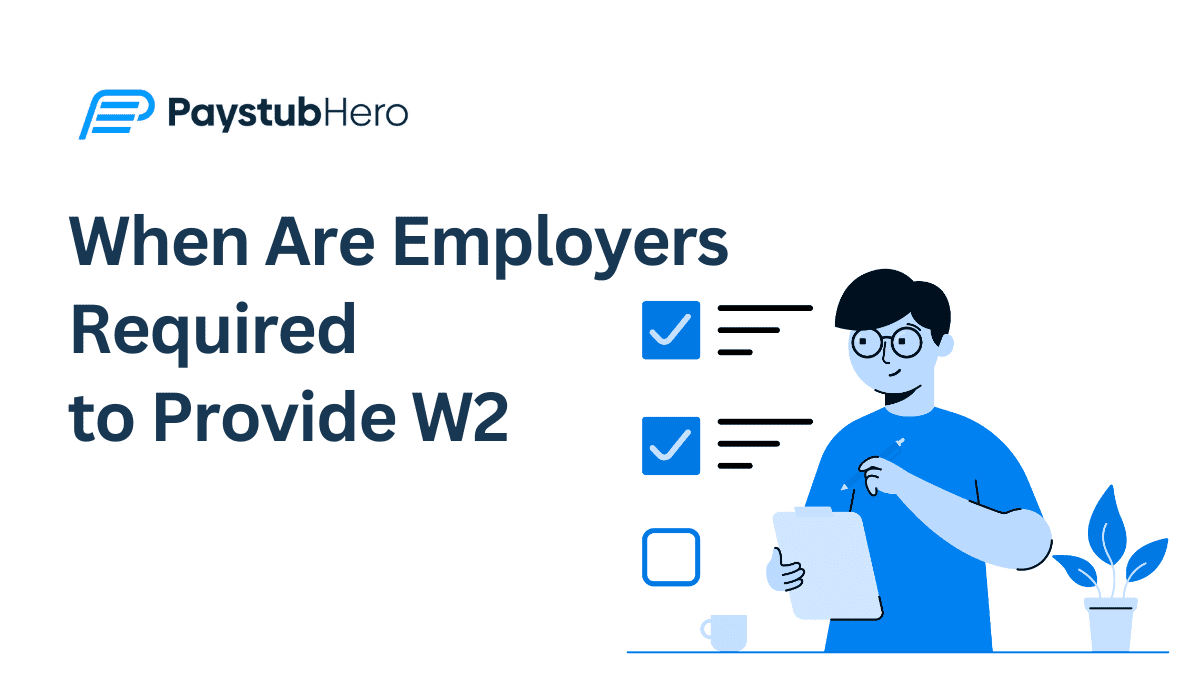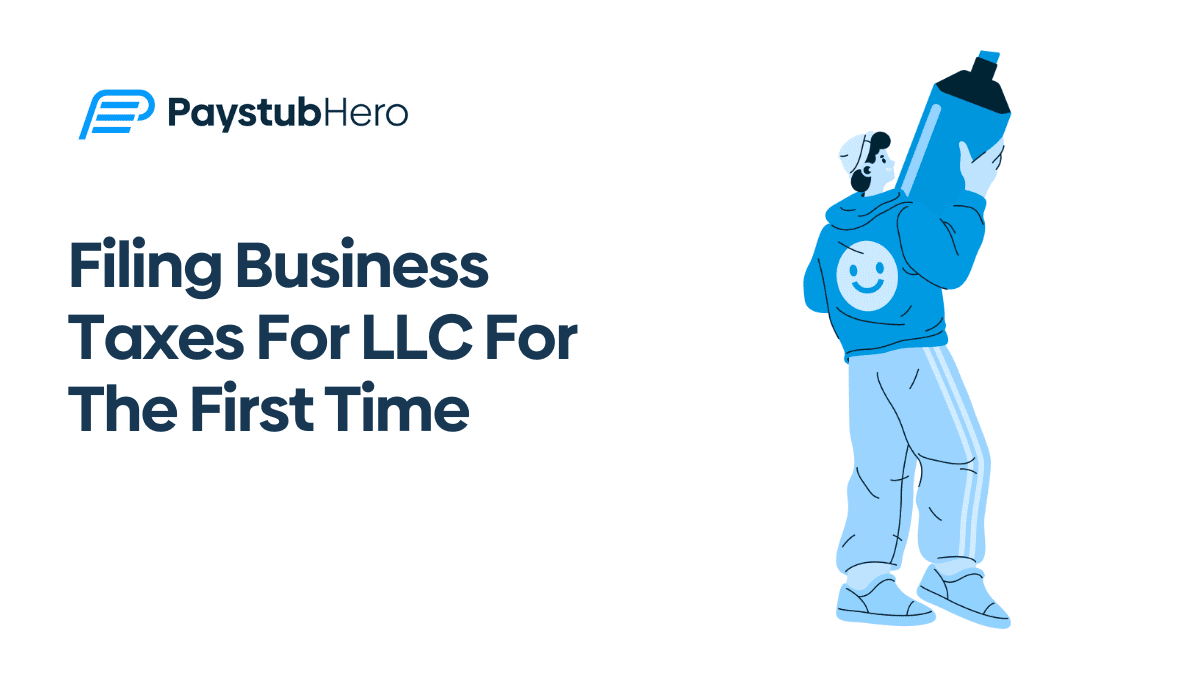Employers are required to provide W-2 forms by January 31st of each year, covering the previous tax year’s earnings. This applies to any employee who earned $600 plus during the year.
Continue reading for more details on W-2 deadlines, employer responsibilities, and what to do if you don’t receive your form on time.
What Is a W-2 Form?
Basically, the W-2 form is a summary of your earnings and taxes for the year. It breaks down how much you made, how much was taken out for taxes, and other things like Social Security and Medicare.
It’s essential because when it’s time to file your taxes, the W-2 helps you figure out if you need to pay more or if you’re getting a refund.
When Do Employers Need to Provide W-2 Forms?
As briefly mentioned above, employers must send W-2s to anyone who earned $600 or more in the previous year.
Missing the January 31st deadline can lead to penalties for the employer and stress for employees who need this form to file their taxes.
Whether you’re still working for the company or not, they are required to get this form to you by that date.
Related: How to Get W2 from Previous Employer
Paper vs. Digital Copies
As for how you’ll get your W-2, employers can either mail out paper forms or provide them electronically. Companies can offer digital versions that you can access and download right away, which can be a convenient option.
If you’re not comfortable with digital copies, you can still receive a paper form by mail.
Employers need your consent before switching to electronic delivery so you can choose what works best for you.
What to Expect
Once you receive your W-2—whether digitally or by mail—you’ll have everything you need to file your taxes. The form outlines your total earnings and taxes paid, so you can figure out whether you owe more or are due for a refund.
Getting the form by the January 31st deadline is essential for staying on track during tax season.
Why This Deadline Matters
The January 31st deadline for employers to provide W-2 forms is more than just a date to circle on the calendar. It’s actually a pretty big deal for both employees and employers.
When this deadline is missed, it can create headaches on both sides.
Let’s explore why getting W-2s out on time is so important and what can happen when that deadline slips by.
1. Delayed Tax Filing for Employees
First and foremost, if employees don’t receive their W-2 form by January 31st, they can’t file their taxes on time. For many people, tax season is stressful enough without having to wait on a key document.
The W-2 shows exactly how much money you earned and how much tax was withheld, which you need to file your return.
Missing this form means waiting longer, and that can delay tax refunds that employees might be counting on for bills, savings, or other expenses. It creates a ripple effect—without the W-2, the whole tax process gets put on hold.
2. Financial Penalties for Employers
For employers, missing the W-2 deadline isn’t just inconvenient. It can cost them. The IRS imposes fines for not providing W-2s on time, and these fines increase depending on how late the forms are sent.
If an employer sends the forms late but within 30 days of the deadline, the fine might be $60 per form. But the longer they wait, the higher the fine gets, up to $330 per form if the delay stretches too far.
So, if a company has dozens or hundreds of employees, those fines can quickly add up, becoming a costly mistake.
3. Frustrated Employees and Broken Trust
When employees don’t get their W-2s on time, it can lead to frustration, and understandably so. Many employees rely on their tax refunds for important things, whether that’s paying off debt, covering bills, or making big purchases.
When they don’t get their forms on time, it can feel like they’re being left in the lurch.
Over time, repeated delays can cause employees to lose trust in their employer’s ability to handle important matters. It’s not just about taxes—it’s about the confidence employees have in their company to take care of them.
4. Extra Attention from the IRS
Missing the W-2 deadline might also invite unwanted attention from the IRS. Employers who consistently miss tax deadlines or don’t follow through on their payroll obligations can trigger audits or reviews from the IRS.
It’s like waving a red flag, signalling that something might be off with the company’s tax practices.
No business wants to deal with the hassle of an IRS audit, especially when it could’ve been avoided by sending W-2s on time.
5. Mistakes and Extra Work for Everyone
Finally, when W-2s are late, it increases the chances of errors.
Employees might try to estimate their earnings and tax withholdings to file on time, but that can lead to mistakes on their tax returns. If they file with incorrect information, they may have to go back later and amend their return, which is extra work no one wants.
On the employer’s side, providing late or inaccurate W-2s means they may have to correct and resubmit the forms to the IRS, which is not only time-consuming but can also lead to additional penalties.
What If You Don’t Receive Your W-2?
So, what happens if January 31st comes and goes and you still don’t have your W-2?
First, reach out to your employer to check on the status. In many cases, it’s simply a delay in mailing or processing. However, if your employer fails to provide your W-2, you can report the issue to the IRS, and they can follow up with your employer.
In the meantime, the IRS allows you to file your taxes using Form 4852, a substitute for a W-2, but you’ll need to estimate your earnings and taxes.
Read More: How to Get W2 from Your Employer
Additional Scenarios for W-2 Issuance
When it comes to issuing W-2 forms, most people think about current employees, but there are a few special situations where the rules are slightly different.
Let’s examine what happens when an employee leaves the company, passes away, or works multiple jobs in a year.
Former Employees
Just because someone leaves a company doesn’t mean the employer is off the hook when it comes to providing a W-2. If you worked for a company at any point during the year and earned at least $600, you are still entitled to receive your W-2.
It doesn’t matter if you quit in January or December—your former employer must still send you the form by January 31st of the following year.
The only thing that changes is how you might receive it.
Since you’re no longer working there, the W-2 will likely be mailed to your last known address or delivered electronically if you’ve given consent for that. So, keeping your former employer updated with your current mailing information is always a good idea to avoid delays.
Deceased Employees
When an employee passes away during the year, the employer still needs to provide a W-2 for the income the employee earned up until the time of death. This form is typically sent to the estate or the legal representative handling the deceased’s affairs.
It’s important to note that income earned after the employee’s death (like final paychecks or payouts) is not reported on the W-2 but on a different form, Form 1099-MISC.
In this particular case, the employer must go through these rules carefully, ensuring the correct forms are issued to avoid complications for the family or the estate.
Employees with Multiple Jobs
If you worked more than one job during the year, you will receive a separate W-2 from each employer. This can happen if you change jobs or have multiple part-time positions.
Each employer is responsible for reporting the income you earned while working for them, which means you’ll need to gather all the W-2s when you file your taxes.
Generate W2s Instantly with PaystubHero
Now, if you’re an employer required to provide W-2s by January 31st, the easiest way to do so is through PaystubHero.
With PaystubHero, you can generate your W-2s instantly, saving you time and avoiding last-minute stress. Plus, this service ensures accuracy and compliance, helping you avoid potential fines or penalties for late filings.
It’s a simple, reliable solution to meet your W-2 requirements without the hassle.
FAQs
Here are the most asked questions about when employers are required to provide W2s.
Employers must provide W-2 forms to any employee who earned at least $600 in wages during the year by January 31st of the following year.
You should receive your W-2 for the 2024 tax year by January 31, 2025.
Employers can submit W-2 forms to the IRS electronically using the Social Security Administration’s Business Services Online (BSO) platform.
Small businesses can create W-2 forms using payroll software or online services like PaystubHero, which guide you through the process.








